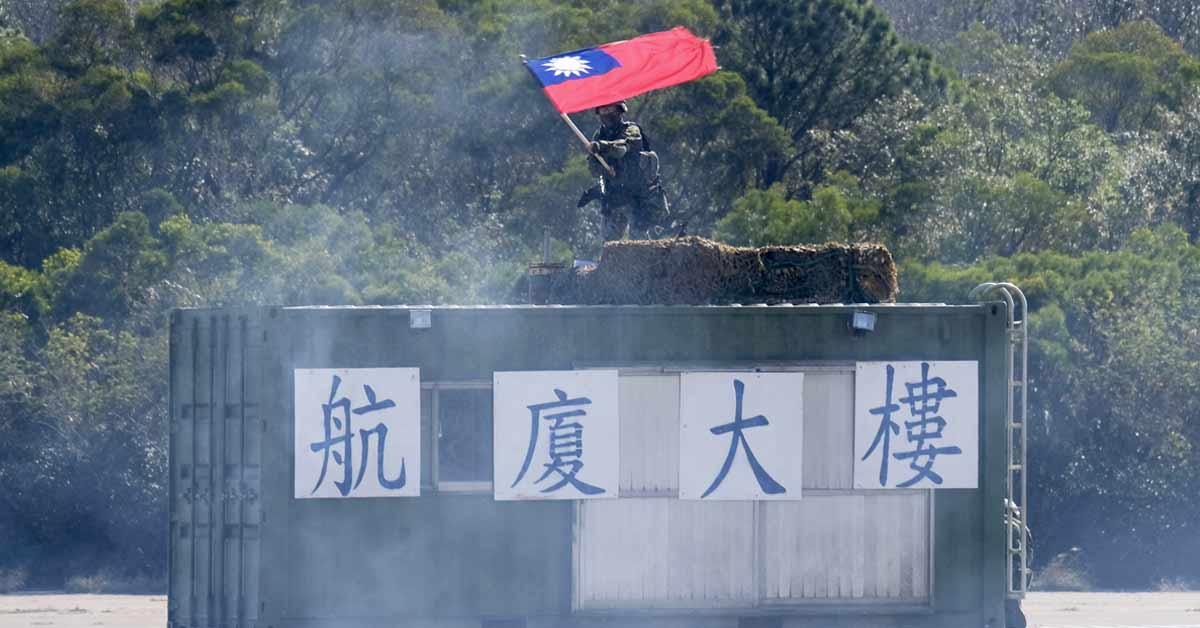For the first time in more than half a century, the United States (US) and Japan are expected this week to make a joint statement on the security of the Taiwan Strait following a meeting between US President Joe Biden and Japanese Prime Minister Yoshihide Suga.
While largely symbolic, the statement would be an indication of increasing concern about the security of the democratically-run island amid dire public warnings from senior US military officials about the threat of an invasion by Beijing, which claims the island as its own.
Admiral John Aquilino recently told a Senate Armed Services committee that taking Taiwan is a “number one” priority for China’s Communist Party (CCP), while US’ Asia-Pacific commander Philip Davidson has said publicly that China could invade in the next six years.
Such fears may seem justified by the threatening tone of the Chinese state media and an escalating number of missions by People's Liberation Army (PLA) aircraft into Taiwan’s air defence identification zone (ADIZ).
But on the ground in Taiwan, people are neither running for one of the island’s 117,000 working bomb shelters nor enlisting en masse.
Having lived under the threat of Chinese military action for the past 70 years, the island’s 23 million people have come to understand what they consider the strange paradox of Taiwan’s existence: even as China’s military might grows, invasion does not necessarily come any closer.
Some experts believe much of the threat assessment by the US military may actually be more of a reflection of a shift in US perceptions about China amid the deteriorating relationship between the world’s two economic giants.
“The (Chinese Communist Party’s) hopes for unification with Taiwan have been clear for decades, and (President) Xi Jinping has made clear during his term that use of force is on the table,” said Eric Lee, a research associate at the Project 2049 Institute in Arlington, Virginia.
“This challenge is nothing new. Rather, it reflects an updated threat perception of the CCP and PLA in the context of US strategic competition with China.”
‘More Difficult Than D-Day’
China has stepped up its activities around Taiwan since Tsai Ing-wen was first elected president back in 2016.
While Tsai’s politics at home are viewed as largely maintaining the status quo in Taiwan’s complex relationship with China, abroad she is associated with a push for a unique Taiwanese identity that is separate from its historic ties to China.
Her politics and her administration’s close relationship with the US have angered Beijing, which claims Taiwan as its own despite having never ruled the island.
As part of Taiwan’s push for more political space, Tsai has sought to bolster Taiwan’s defences by raising the defence budget, reforming the reserves, improving its image from historical associations with the martial law era, and purchasing billions of dollars in arms from the US since taking office.
Her administration has also seen a push to revive Taiwan’s domestic weapons manufacturing, including locally-made submarines, armoured vehicles, and military aircraft, according to the Ministry of Defense.
“The CCP has not given up on the use of force to invade Taiwan, and the Chinese military has continued to strengthen its combat readiness, and readiness to increase the CCP’s use of force,” the ministry said in a statement.
“There is always a risk of seizing Taiwan. Whether it is a sudden attack… or a full-scale invasion, it will seriously impact the country’s survival and development. Therefore, supporting the defense operations of various military building and preparation work is the core task of the national army.”
In late March, the Ministry of Defense said incursions into Taiwan’s ADIZ had become so frequent that it would no longer scramble to meet the aircraft each time and would instead track them with missiles. The Ministry said the decision was made on the assessment that the flights were consuming resources and increasing the risk of a miscalculation or accident.
And while some, particularly in the US, have begun to speculate that an amphibious invasion by the PLA is somewhere on the horizon, most experts take a more measured approach, stressing that an invasion of Taiwan carries significant risks for China.
First, its forces would have to cross the 180-kilometre (100-mile) Taiwan Strait with more than 100,000 soldiers and supplies, according to Michael Tsai, who served as Taiwan’s vice minister of defence and then minister of defence between 2004 and 2008.
En route, they would face aerial and naval bombardment and, if they managed to land, strong local resistance.
“If Taiwan was attacked by the PLA, more than two-thirds of young people would take affirmative action to resist Chinese action,” the former defence minister said. “Taiwan is a free and democratic country. We like to live in a peaceful coexistence with China but if we were attacked, we have to react for some defences. Of course, we will suffer a lot. Many young people will lose their life, but so will the PLA.”
There would be other issues to contend with as well, including challenging terrain, unpredictable weather patterns and even typhoons.
For Taiwan expert and historian Bill Sharp, a former visiting scholar at National Taiwan University, such a manoeuvre would be “more difficult than a D-Day Landing” due to Taiwan’s geography, rough waters, and unreliable weather patterns. Its coastline also offers few suitable beaches, he said, for landing “armoured personnel carriers, tanks, artillery, or large numbers of invading troops.”
A missile attack, meanwhile, would lead to a far greater loss of human life and destruction of infrastructure and would fuel opposition to any invading force.
“China would prefer to rule Taiwan as it physically is,” he said. “With their society violently attacked, Taiwanese will to fight will be piqued.” – Al Jazeera
Related Articles:
